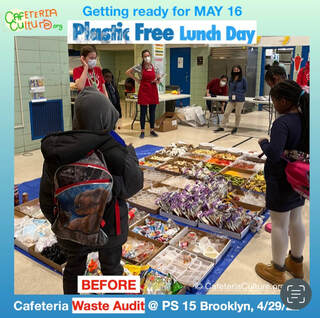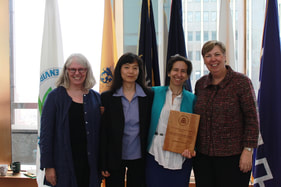
About
Post Content
Who We Are
Cafeteria Culture (CafCu)—originally founded as Styrofoam Out of Schools—is a New York City based national nonprofit that transforms school cafeterias into powerful youth action hubs. We address food waste, plastic pollution, and promote local composting, by equipping youth with the tools to lead change in their schools and communities.
Based in New York City, CafCu works creatively with youth to design and implement pilot projects that are replicated and scaled nationally. Our partner schools primarily serve students living in public housing and shelters.
We use easy-to-use educational media—a blend of science, civics, video production, and the arts—to build youth agency and elevate the voices of young leaders to make long-lasting change.
What We’ve Achieved
In 2015, we helped catalyze the elimination of Styrofoam trays from all New York City public school cafeterias.
In 2019, we released Microplastic Madness, an award-winning documentary co-created with our students. It has been screened in over 45 countries and continues to inspire student-led action for a more sustainable future. (Free screenings are available for under-resourced schools.)
In 2022, we launched Plastic Free Lunch Day (PFLD), now an official initiative across more than 750 NYC public schools and a growing national campaign reaching over 3,000 schools.
Our Mindful Choice Meals (MCM) program gives students a voice at the lunch line, resulting in up to 40% less food waste, 30% more food consumption, and significantly reduced plastic use. The program also supports nutrition education and meets USDA meal guidelines.
Through our local composting pilots, we are helping schools reduce waste to manageable levels and process food scraps on-site or at nearby community composting sites. These efforts are helping us create scalable models for school-based sustainability.
At CafCu, we are committed to building replicable solutions that integrate waste reduction, refill and reuse, and composting—led by students who are ready to take action for a healthier future for themselves and their communities.
Microplastic Madness is the winner of many prestigious film festival awards including:
- Peggy Charred Award for Excellence, Boston International Kids Film Festival
- Best Documentary – Amateur Category (over 40 minutes), Raw Science Film Festival
- Best Feature Documentary Film – Audience Choice, Providence Children’s Film Festival
- Best Documentary Feature Award – Youth Jury, Children’s Film Festival Seattle
- Best Solution Award, Cinema Verde Environmental Film and Art Festival
Students in our programs debate the issues, collect local data, analyze their own data, conduct video interviews, design solutions, and educate decision makers with their persuasive, personal storytelling that is supported by their own data. Their leadership accelerates solutions that address plastic pollution.
Awards
2022-23 – a competitive Japan Foundation Grant for our Okinawa & New York Youth for Global Plastic Pollution Action program that partners students from two schools in Iriomote Island in Okinawa, Japan with students from our NYC partner school, PS/MS 188 the Island School, to foster a student-driven exploration of the plastic pollution problem that plagues both countries.
2022-23 – a competitive US EPA grant for our School Cafeteria Waste Reduction Interventions program to pilot low-cost, scalable interventions with detailed waste audits, video documentation and student partnership and messaging to dramatically reduce food and food packaging waste.
2016-2017 – a competitive US EPA grant for piloting Trash Free Waters interdisciplinary education in 3 schools, including PS 15, which led to the creation of our award winning movie, “Microplastic Madness.”
2015 – CafCu was one of only five North American organizations to receive an inaugural UL Innovative Education Award for advancing STEM education, sustainable communities, and youth empowerment for our ARTS+ACTION school program (awarded via North American Association of Environmental Education);
2013 – Education Quality Award from the US Environmental Protection Agency (EPA) Region 2.


Featured Initiatives


